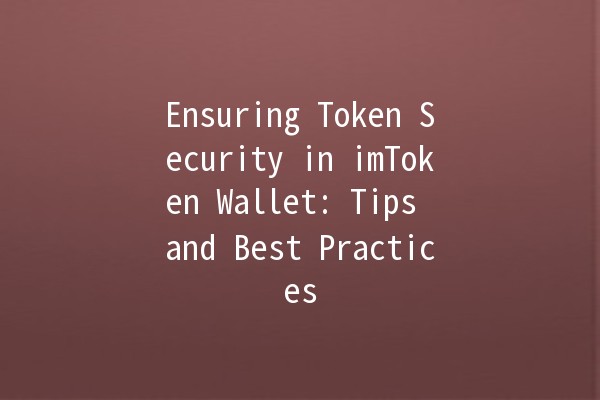In the rapidly evolving landscape of cryptocurrency, the security of tokens is paramount for users who store and manage their digital assets in wallets like imToken. As a popular multichain wallet, imToken offers users a wide range of functionalities, but understanding how to secure tokens within this platform is essential for every investor. Below, we present practical tips and techniques aimed at enhancing the security of tokens stored in iToken wallet, ensuring peace of mind for users in the digital asset space.
Token security refers to the measures and protocols that protect digital assets from unauthorized access, theft, or loss. In the case of imToken wallet users, being proactive about security not only protects their investments but also enhances their overall cryptocurrency experience. With this in mind, let’s explore effective strategies to ensure token security in the imToken wallet.
One of the simplest yet most effective strategies for enhancing wallet security is the use of strong passwords.

A strong password typically combines uppercase letters, lowercase letters, numbers, and special characters, making it difficult to guess or crack.
Creating a Strong Password: Use a password manager to generate complex passwords. For example, instead of using "cryptopass123", consider "C!ypt0P@55w0rd#2023".
Implementing TwoFactor Authentication (2FA): Enable 2FA on your imToken account. This adds an additional layer of security, requiring a second form of verification (like an SMS code) whenever you log in or perform sensitive actions.
Keeping the imToken wallet app up to date is crucial for security. Developers continuously patch vulnerabilities and improve features.
Updates often include essential security improvements that protect users against emerging threats.
Check for Updates: Regularly visit your app store to check for the latest version of imToken. Set your device to enable automatic updates whenever possible.
Feature Awareness: Familiarize yourself with new security features added in updates, as they may provide additional protection for your assets.
Backing up your wallet information is a vital step to ensuring that you do not lose access to your tokens in case of device failure or loss.
Backing up includes saving your mnemonic phrase, private keys, and other sensitive information securely.
Safe Storage: Write down your mnemonic phrase on paper and store it in a secure location (such as a safe) instead of just keeping a digital copy.
Regular Backups: After significant transactions or changes, ensure your backup files are updated to reflect your current wallet status.
Phishing attacks are common tactics used by cybercriminals to steal personal information and access users’ wallets.
These attacks often come in the form of misleading emails, fake websites, or messages asking for sensitive information.
Check URLs Carefully: Always ensure you are logging into the official imToken website or app. Be cautious of lookalike URLs.
Verify Communication: If you receive an unexpected message from support or a transaction alert, doublecheck its authenticity before responding or clicking links.
For users holding significant amounts of cryptocurrency, using hardware wallets in conjunction with imToken can offer enhanced security.
Hardware wallets store your private keys offline, making them less susceptible to malware and hacking attempts.
Choosing a Hardware Wallet: Consider reputable options like Ledger or Trezor and integrate them with your imToken wallet for added security.
Transferring Funds: For longterm storage, transfer a bulk of your tokens to your hardware wallet, using your imToken wallet only for trading or transactions.
Vigilance is key in maintaining token security. Regularly monitoring account activity helps identify potential threats early on.
Frequent checks can reveal unauthorized transactions or attempts to access your wallet.
Transaction History: Regularly review your transaction history within the imToken app. Look for any unfamiliar transactions and investigate immediately.
Set Up Alerts: Utilize notifications for transactions, changes in security settings, or any changes made within your wallet, enabling you to react swiftly if anything seems amiss.
Yes, imToken wallet employs various security protocols to protect user assets, including encryption and multisignature support. However, users are responsible for implementing personal security measures, such as strong passwords and 2FA, to enhance the safety of their tokens.
If you forget your password, use the recovery options provided by imToken. Ideally, you should have backed up your mnemonic phrase, which allows you to restore your wallet. Without this, access may be permanently lost.
It’s generally advisable to change your password periodically—every six months is a good practice—especially if you notice any suspicious activity or after public events that may expose your information.
Yes, you can access your imToken wallet on different devices as long as you have your login credentials and mnemonic phrase. However, ensure that security measures, like 2FA, are active on each device used.
Immediately change your password, reenable 2FA, and transfer your assets to a new wallet if possible. Monitor your accounts for any unauthorized transactions.
While hardware wallets are significantly safer than software wallets, they are still vulnerable to theft or loss. Always purchase hardware wallets directly from the manufacturer to avoid tampering during shipping.
By adopting the above strategies, imToken users can protect their digital assets from potential threats and gain greater confidence in their cryptocurrency management. Each of these techniques, when implemented correctly, contributes to a more secure wallet, safeguarding tokens against unauthorized access and malicious activities.
Whether you're a seasoned investor or a beginner in the cryptocurrency realm, understanding the importance of security measures ensures that your digital assets are wellprotected, allowing you to focus on your investments without constant worry. Always remember that in the world of finance, prevention is better than cure, and being proactive about security can save you a lot of trouble in the long run.